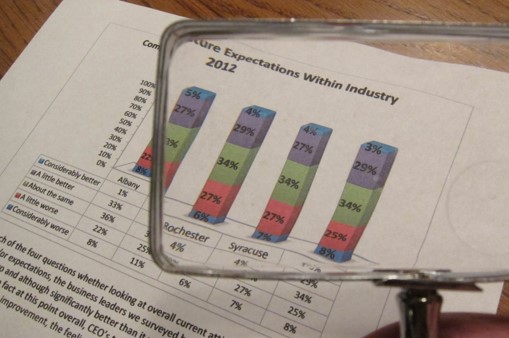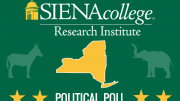Second Annual Survey of Pennsylvania Business Leaders
1/18/11
Summary of Findings
Summary
The Second Annual First Niagara Survey of Pennsylvania Business Leaders conducted by the Siena College Research Institute (SRI) shows that CEO confidence has significantly increased since last year. Today, more business leaders are positive about their current economic picture and far more are optimistic towards the future than those that continue to express current negativity and pessimism about the future. Growing numbers of CEO’s in Pennsylvania are now prepared, to not only say that they have survived the economic downturn, but that they are back in, and open for business. A majority of the most confident predict an uptick this year in profits and hiring. Unfortunately, a majority of CEO’s rate recent state government as doing a poor job of creating a successful business climate, but over a third are at least somewhat confident that the state government will work to improve business conditions in 2011. Still, growing percentages of CEO’s are more optimistic this year than last. Increasing numbers of CEO’s are now concentrating on growing their businesses and serving their clients more so than simply trying to survive. Based on Pennsylvania’s CEO’s, 2011 is likely to be a more robust economic year in the Keystone State.
Business Leader Confidence
The overall Index of Pennsylvania Business Leaders reached 115.7 up 16.1 points from last year. The Index is now well above the 100 mark at which equal percentages of CEO’s are both optimistic and pessimistic about economic conditions in their industry and across the state. The current index component that assesses business conditions today as compared to six months earlier is now 104.2 up 21.9 from last year. The future component that measures expectations for the coming year is 127.2 up 10.2 from a year ago. These increases are dramatic and signal a significant increase in business leader confidence. Forty-six percent of CEO’s of private, for-profit companies with sales between $5 million and $200 million in Philadelphia, Pittsburgh, as well as in Allentown, Altoona, Erie, Harrisburg, Lancaster, Reading, Scranton and York now expect better economic conditions in Pennsylvania next year. Only 17 percent compared to 25 percent last year anticipate worsening conditions.
This survey reports data from 872 corporate leaders drawn from Service (24%), Manufacturing (21%), Retail (17%), Wholesale/Distribution (15%), Engineering/Construction (13%), Financial (5%) and Food/Beverage (5%). If equal numbers of CEO’s had positive and negative perceptions of and expectations for the general economy as well as for the condition of and future for their industry, the overall index would be 100. Wholesale/Distribution (122.0), Manufacturing (119.6), Retail (118.6) and Financial (118.5) have the highest overall index readings but every sector improved substantially from last year. Geographically, confidence is consistent across the state.
Twenty-five percent, down markedly from 40 percent, of CEO’s now say that business conditions have worsened in Pennsylvania over the last half of 2010 while 33 percent feel as though the economy has already improved. Pennsylvania has reached the point this year at which more CEO’s say conditions have already begun to improve rather than those that continue to experience decline. And looking to the future, by ratios that exceed two-to-one, CEO’s anticipate ever improving economic conditions across the state and within their industry.
Based upon CEO’s responses to the four key index questions, the study identifies three distinct groups of business leaders today in Pennsylvania. Forty-three percent of CEO’s, up from 35 percent a year ago, report being able to currently thrive and are strongly optimistic about the future. Forty-three percent of CEO’s (up from 40% in 2009) acknowledge being seriously impacted by recent economic conditions, but they tend to feel as though things are beginning to improve. The remaining 15 percent (down from 25% a year ago) have been very seriously affected by the economy and believe that economic conditions may continue to worsen in both Pennsylvania and their industry before getting better.
Revenues, Profits and Labor Force
Expectations for revenues and profits through 2011 have increased among CEO’s this year, and those that fear continuing revenue declines have significantly lessened. While CEO’s plans to acquire new fixed assets are up only slightly from last year, more than twice as many, 25 percent plan to enlarge their workforce this year as compared to 11 percent (down from 13%) planning layoffs.
Forty-six percent of CEO’s anticipate increasing revenues during 2011 as compared to 39 percent last year, and only 17 percent expect less revenue this year as compared to 23 percent having that expectation last year. Thirty-seven percent anticipate increasing profitability this year (up from 32%) while only 26 percent (down from 30%), continue to expect profitability declines.
Despite increasing confidence and growing expectations of higher revenues and profits, fixed asset acquisition plans remain at only 43 percent (up from 40%). Of those that do anticipate asset acquisitions, 62 percent plan to use internally generated funds as opposed to either borrowing from a financial institution (27%) or private equity (4%).
Twenty-five percent of business leaders expect to at least moderately increase their workforce in 2011 up from 21 percent a year ago. While 64 percent intend to have their workforce remain the same, 11 percent, down from 13 percent, plan on decreasing their labor force. Pennsylvania’s CEO’s anticipate doing more business but are hesitant to acquire assets or to hire more workers.
Concentrations, Challenges and Attitudes towards Government
Today a growing number of CEO’s are becoming more focused on growing the market for their products and services. Market growth as a top profit enhancement strategy remains steady at 39 percent. Still, 32 percent continue to put cost reductions first with optimistic companies tending to target growing sales while the more pessimistic companies still primarily look to cost cuts as a business strategy.
The top two concerns among Pennsylvania business leaders are, when asked to name their single most vexing problem, adverse economic conditions (21%) and governmental regulation (20%). Health care was mentioned by 77 percent but only 14 percent see it as the top concern.
Thirty-eight percent of CEO’s call on the new Governor and Legislature to cut spending as their top focus. Fifty percent say the government of Pennsylvania has been doing a poor job of creating a business climate in which their company can succeed and 67 percent are either not very or not at all confident in the ability of the government to improve the business climate in Pennsylvania. Still, with 34 percent expressing confidence in the state’s ability to promote business, CEO’s have a small but growing belief that state government can become a partner in improving economic conditions rather than a problem to be overcome.





